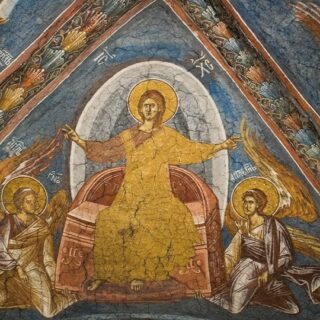
When should one fast? What different kinds of fasting are there and why? What does fasting do for you?
The Kinds of Fasting
In order to answer these questions best, I will rearrange the order of them. First of all, let’s look at what kinds of fasting there are and the reason for them. In our times we use the word “fasting” to refer to two quite distinct practices. Strictly speaking, fasting means not to eat anything for a prescribed period of time, such as a day or a part of a day. In the early Church for instance, people “fasted” for two days before Easter, that is they didn’t eat anything, but may have been allowed a little water. In our day, we “fast” (strictly speaking) in only one situation — before Holy Communion.
Today we also apply the term “fast” to the quite different practice known as “abstinence” which means not eating certain prohibited foods over a longer period of time, while eating other, permitted, foods during the “fast period.”
So, except for the fast from all foods during the hours from midnight to the reception of Holy Communion, what we are really talking about when we refer to fasting today is “abstinence.”
The Spiritual Fast
Here we need to mention another kind of “fasting” which must accompany the fast from foods. It is the “spiritual fast.” This helps answer your question, “What does fasting do for you?” Merely avoiding foods completely or certain designated foods for a time, does have some good effect on us in that it helps us develop a measure of discipline. Alone, however, it is only slightly better, from a spiritual point of view, than dieting. Only when fasting is seen as part of our Christian struggle to grow in the direction of fulfilling our purpose to become God-like does it begin to take on spiritual significance for us. Fasting, thus, has always been connected with repentance for our sins, an aid to helping us overcome temptations, a strengthening of our sensitivity to God in our lives, and an orienting of our wills to direct our lives in the Lord’s paths. When we accompany our material fast with the spiritual fast then we are truly fasting, as our Lord both practiced Himself and taught us (read Matthew 6:16; Mark 2:20 and Mark 9:29).
Times For Fasting
When should one fast? There is one almost unexceptional rule which regards the fast before Holy Communion. Except for the sick, infirm and the dying, we should not eat or drink anything after midnight until after we receive Holy Communion. As regards fasting as abstinence. the Church has designated a number of periods for such fasting. They are: nearly all Wednesdays and Fridays; the Great Lent, before Pascha; Advent, before Christmas; the two-week period before the Dormition of the Theotokos (August 15); the fast of the Apostles (in June-July). Monks who keep these fasts do not do any other special abstinence before receiving Holy Communion. It has become a custom, however, for those Christians who do not keep them all, to also fast (abstinence) for several days prior to Holy Communion, especially if they receive Holy Communion infrequently, as a kind of spiritual preparation.
What Foods?
In order to complete these questions an additional one would have been appropriate: “Which foods should we abstain from?” There is only one set of rules on this question in the Church Canons. These refer to the Great Lent, the most severe of the periodic fasts. This rule is known as “dry eating” or “xerophagy” which excludes meat, fish, alcoholic beverages, eggs, milk, cheese, and oil. That leaves bread, water and vegetables.
Most Christians who are not monks will not fast so strictly, and will adjust their diet according to their ability. The absolute minimum is avoidance of meat. If you are eating meat you cannot be said to be fasting. The austerity of your fast then, would be based on a sliding scale which would be the least possible (avoidance of meat only) to the most severe which would include all of the above monastic prohibitions as listed. In between, where most of us can manage, following a general descending order, as listed above, makes the abstinence more austere. Thus, if you are avoiding meat, the next step is fish. If you are avoiding meat, fish, alcoholic beverages, the next is the avoidance of eggs. Next is all of the above and dairy products. The strictest fast (abstinence) is the avoidance of all the above and oil.
Fasting before Communion
The Church has usually required a certain amount of fasting before Holy Communion, at least on the day we receive Holy Communion. This minimum fast, however, has been connected with the whole spiritual discipline of the Church. People who do not receive frequently and do not keep the other fasts of the Church should prepare for Holy Communion with a three-day fast, according to St. Nicodemus. Those who receive more frequently require a shorter fast. It should be remembered that the fast is only a part of our preparation for Holy Communion.
Unfortunately, much confusion and much scandal is created by the question of fasting before Holy Communion. It is closely connected with the question of the frequency with which we receive Holy Communion. Many of us were taught as children to fast a week or more from meat, fish, eggs and dairy products before receiving Holy Communion. It was a long-held practice to receive Holy Communion only three or four times a year. Others argue that rigorous fasting before Holy Communion should not take place so that we can receive more frequently. They note that the Divine Liturgy calls all those present each Sunday to “draw near” to the chalice.
Because this is a question which concerns many of us, and is somewhat complex, the rest of this column will be devoted to its response.
The Frequency of Holy Communion
There is no doubt that the early Church recommended frequent Holy Communion and that the majority of Christians received at least weekly at Sunday Liturgy. St. Basil says it is good to receive daily, and that he himself received four times a week (Letter to Patrician Ceasaria). Chrysostom refers to people who receive “frequently,” and criticized those who do not. The Holy Canons teach the same. Attendance at Liturgy for the early Church meant receiving Holy Communion (8th and 9th of the Apostolic Canons, 2nd Canon of Antioch). The Divine Liturgy itself implies that those who are present receive Holy Communion. Later writers such as Theodore the Studite, Nicholas Cabasilas, Gregory Palamas. Symeon of Thessalonike, and Nikodemos the Hagiorite, all saints, teach the same.
The Need for Preparation
But the tradition of the Church also points to the need that we approach the chalice “worthily.” That side of the question is addressed by St. Paul when he teaches that he who “unworthily eats and drinks, eats and drinks judgment upon himself” (1 Cor. 11:28-29). St. Chrysostom notes that “I see many who receive the Body of Christ, carelessly and casually, and out of custom and rules, rather than attentively and with a pure conscience” (Commentary on Ephesians). Elsewhere he asks: “Whom should we commend, those who receive once a year, those who receive frequently or those who receive just a few times a year?” None of them,” he answers, “but rather those who receive with a clear conscience and a spotless life” (Commentary on Hebrews). We are to receive following spiritual preparation: repentance for sins, reconciliation with those we may have harmed, confession to a priest when needed, good works of charity and service, extra devotional practices and fasting from foods. So, fasting should be seen only as part of the preparation — but a necessary part.
The Fast on the Day We Receive
There is an unbroken tradition that we fast from all food and drink prior to receiving Holy Communion. The early Church conducted the Eucharist frequently in conjunction with meals. But since the adoption by the whole Church of the 48th Canon of the Council of Carthage (419), both priests and laity are expected to fast strictly (no food or drink) previous to receiving Holy Communion. This order is kept as well, in a special way, when we receive Holy Communion at evening Liturgies. We eat a very light breakfast and lunch (no meat or fish), sleep for a time in the afternoon, and take nothing by mouth until after Holy Communion.
How Long Should We Fast?
Since we need to prepare for Holy Communion and fasting is a part of that preparation, some fasting is required’ of all before Holy Communion. How much depends in large part on how frequently you receive and your other fasting practices. A person who receives once a year and does not keep the weekly and seasonal fasts at all, and lives a life much separated from Christ, may need to fast, as St. John Chrysostom indicates in his “Commentary on Ephesians,” for forty days! Others who fast in some measure at least during the Advent (Christmas Fast) and Great Lent (Easter), and who keep the other fasts, including Wednesdays and Fridays, need not fast anywhere near as much. Should such persons, say, receive ten or twelve times a year (approximately once a month), what St. Nikodemos the Hagiorite says seems to apply: “Three days fasting is sufficient therefore, in spite of the fact that fasting before partaking Communion is not directed by the divine canons” (Pedalion, p. 307). Since strict fasting on Saturdays is prohibited by the canons of the Orthodox Church (64th Apostolic and 55th of Trullo), those who prepare to receive on a monthly basis avoid meat on Saturday, but may eat other foods.
Frequent Communion and Fasting
Those who receive Holy Communion frequently, that is, every Sunday, or every other Sunday as well as on weekday feasts and who also fast Great Lent, Advent Lent, the August Fast of Panagia, the Fast of the Apostles and Wednesdays and Fridays of each week (that is, those who prepare fully), according to ancient custom and practice, do not need to fast any further in preparation for Communion.
What, however, of those who wish to receive Holy Communion frequently, but don’t keep all the other fasts prescribed by the Church? It seems to me that the need for adequate preparation and the avoidance of scandal (1 Corinthians 8), demand some fasting. Perhaps a strict Friday fast and the avoidance of meat on Saturday, would serve the purpose.
Final Comments
We should be careful not to approach the question too legalistically or rigidly. Adequate preparation can never be counted only in “days fasted”; the ideal should be to approach the chalice as worthily as possible, as frequently as possible and as reverently as possible.
Also, what I’ve written above seeks to provide some suggested guidelines which take account of the major aspects of an admittedly complex situation. It is an opinion. Our Bishops may want to respond in a more formal manner for the good and well-being of the Church. When they do this, we will all want to conform to their directives, I’m sure.





